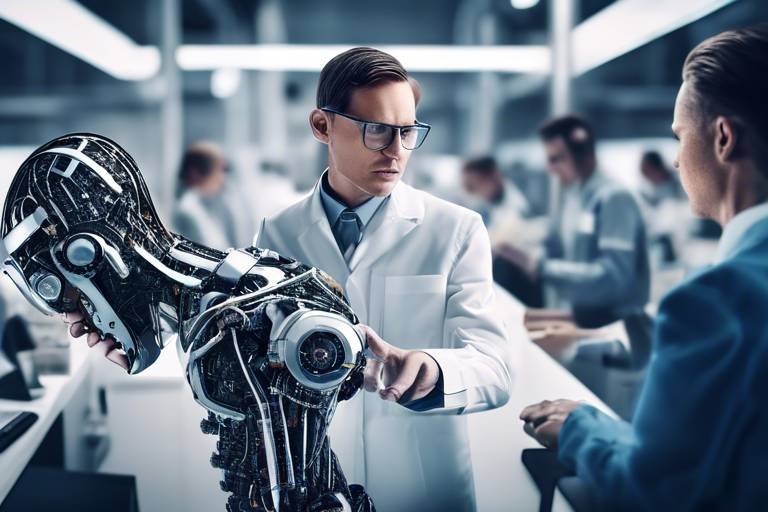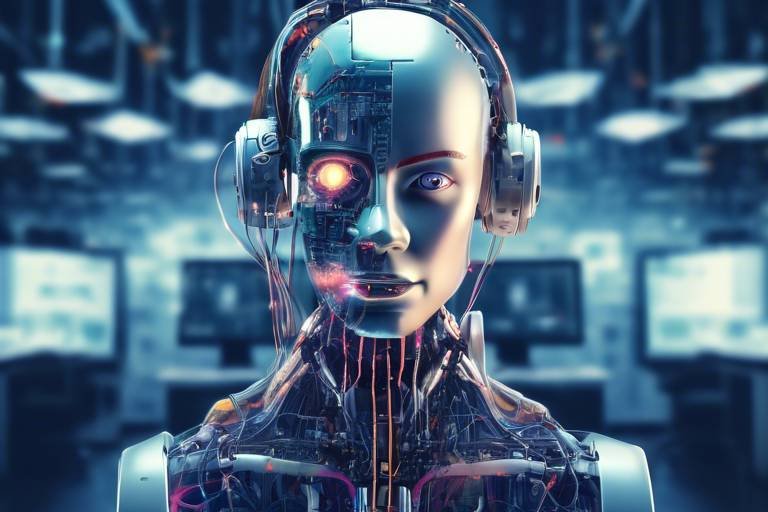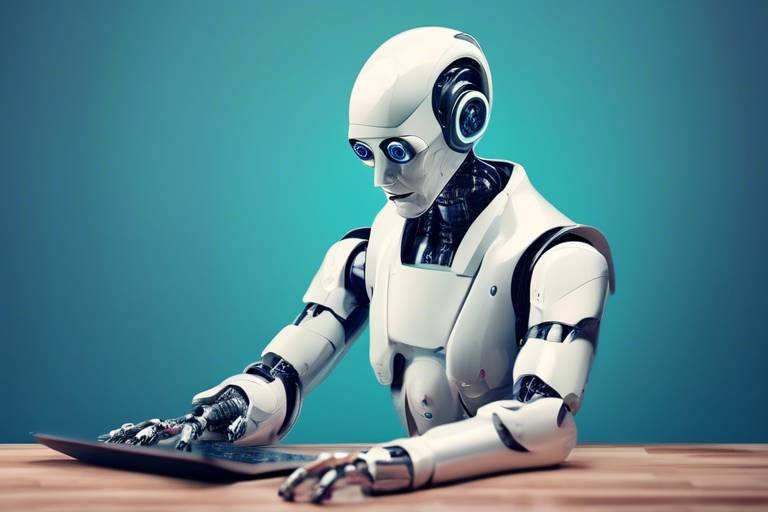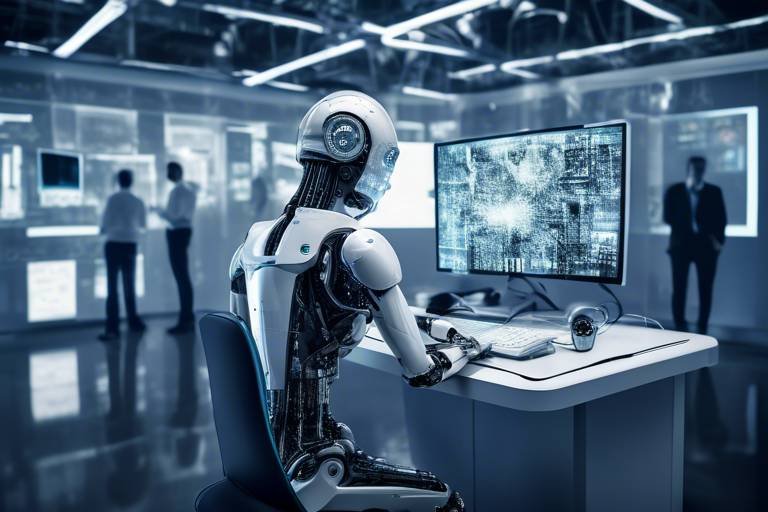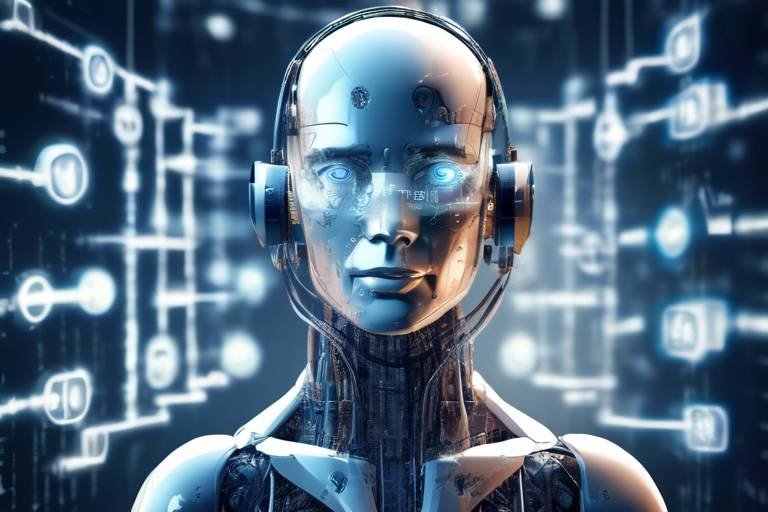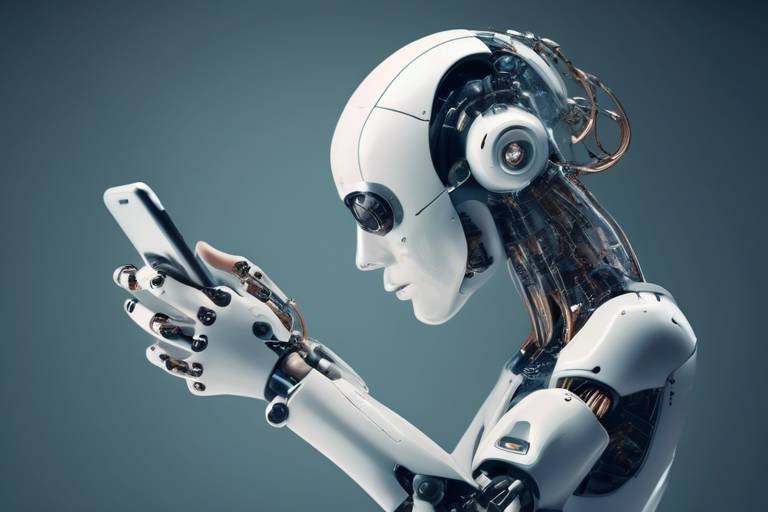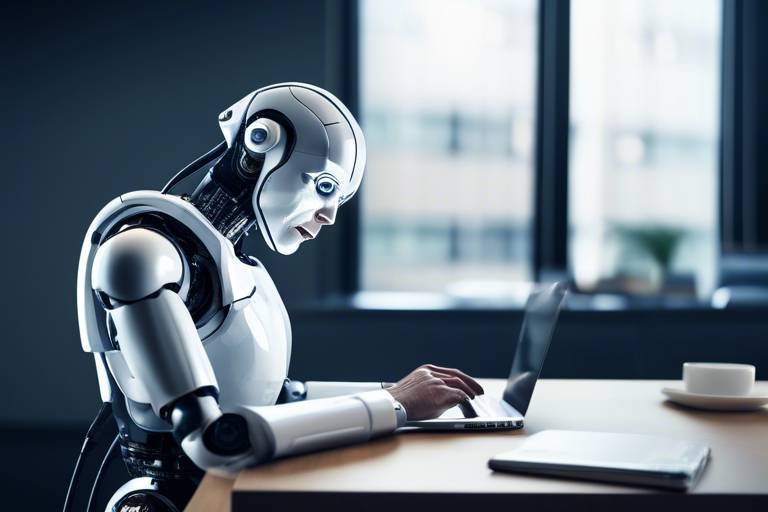Work in the AI Age: Future Transformation and Adaptation
In today's rapidly evolving landscape, the integration of artificial intelligence (AI) into our workplaces is more than just a trend; it’s a profound transformation that is reshaping how we work, interact, and innovate. Imagine walking into an office where your tasks are streamlined by intelligent systems that predict your needs and assist you in real-time. This is not the future; this is the present, and it’s imperative to understand how AI is influencing job roles and workflows across various industries.
AI is not just about robots taking over tasks; it’s about enhancing human potential. By automating repetitive tasks, AI allows professionals to focus on more complex and creative aspects of their jobs. For instance, in the healthcare industry, AI algorithms analyze patient data to assist doctors in diagnosing diseases more accurately and swiftly. Similarly, in finance, AI tools analyze market trends, enabling analysts to make data-driven decisions that were once time-consuming. This shift emphasizes the need for workers to adapt and acquire new skills that complement these technologies.
As we delve deeper into the age of AI, it becomes clear that understanding the impact of these technologies is crucial. Not only must we adapt to the changes in our roles, but we also need to be proactive in our approach to learning and development. The question arises: how can we equip ourselves for success in a world where AI is becoming increasingly prevalent? The answer lies in recognizing the essential skills needed for the future and embracing a mindset geared towards continuous growth.
In this article, we will explore the vital skills that are becoming indispensable in an AI-driven environment. We will also discuss strategies for adapting to the inevitable changes that AI brings and how organizations can foster a culture of innovation and collaboration. As we navigate this exciting yet challenging era, one thing is certain: the ability to adapt and thrive in the AI age will define the future workforce.
Understanding the integration of AI technologies in various industries and its impact on job roles and workflows is crucial for navigating the future of work. AI is revolutionizing sectors from manufacturing to marketing, enabling businesses to operate more efficiently and effectively. However, this integration also raises concerns about job displacement and the need for reskilling. The key to overcoming these challenges lies in embracing AI as a tool for enhancement rather than a threat.
As AI continues to evolve, certain skills will become increasingly valuable. In an AI-driven environment, workers must adapt and develop competencies that not only align with technological advancements but also enhance their professional capabilities. This section discusses the essential skills that will be in high demand, ensuring that individuals remain competitive in the job market.
Technical proficiency in AI tools and data analysis is becoming essential. In a world where data drives decisions, having the ability to navigate and leverage AI technologies can set you apart. Workers should focus on developing specific technical skills that are in demand across industries, such as:
- Data Literacy: Understanding how to interpret and utilize data effectively.
- Programming Knowledge: Familiarity with coding languages to enhance job prospects.
The ability to interpret and utilize data effectively is vital. In the workplace, decisions are increasingly being made based on data analytics rather than intuition alone. This shift underscores the importance of data literacy—being able to read, understand, create, and communicate data as information. Organizations are looking for individuals who can not only analyze data but also draw insightful conclusions that inform strategy and drive results.
Basic programming skills can enhance job prospects significantly. While you don’t need to be a coding expert, familiarity with programming languages like Python or R can give you a competitive edge. As AI tools become more integrated into everyday tasks, understanding the basics of how these systems work can empower you to leverage them effectively.
In addition to technical skills, soft skills play a significant role in the AI age. As automation increases, the human touch becomes even more valuable. Skills such as communication, teamwork, and problem-solving are essential for collaboration and innovation. Employers are looking for individuals who can work well with others, adapt to changes, and bring creative solutions to the table.
Adaptability is key in a rapidly changing work environment. As AI continues to evolve, individuals and organizations must embrace change and leverage AI effectively. This section outlines strategies for adapting to these changes, ensuring that both employees and employers can thrive in the face of technological advancements.
Lifelong learning is crucial for staying relevant. In an era where new technologies emerge at a staggering pace, ongoing education and training are essential. Whether through online courses, workshops, or professional development programs, investing in your skills is the best way to prepare for the future.
A growth mindset fosters resilience and adaptability. Cultivating this mindset can help individuals navigate the challenges posed by AI. Rather than fearing change, those with a growth mindset view challenges as opportunities to learn and grow, making them better equipped to handle the uncertainties of the future.
AI is not only changing job roles but also workplace culture. Organizations must foster a culture that embraces innovation and collaboration in the age of AI. By promoting open communication and encouraging creative thinking, companies can harness the potential of their workforce while integrating AI technologies seamlessly. The future of work is not just about technology; it’s about people, and how we work together to achieve common goals.
- How will AI impact job availability? AI is expected to automate certain tasks, but it will also create new job opportunities that require different skills.
- What skills should I focus on developing? Focus on both technical skills like data literacy and programming, as well as soft skills such as communication and problem-solving.
- How can I stay relevant in my career? Engage in continuous learning and embrace a growth mindset to adapt to changes in your industry.

The Rise of AI in the Workplace
The integration of artificial intelligence (AI) into the workplace is not just a trend; it's a revolution that is reshaping how we work and interact with technology. Imagine walking into your office and seeing robots collaborating with humans, algorithms analyzing data in real time, and virtual assistants managing your schedule. This is not a scene from a sci-fi movie; it’s our new reality. The question is, how do we navigate this transformative landscape?
Understanding the impact of AI on job roles and workflows is crucial for anyone looking to thrive in today's economy. AI technologies are being adopted across various industries, from healthcare to finance, and even in creative fields like marketing and design. For instance, in the healthcare sector, AI systems are assisting doctors in diagnosing diseases more accurately, while in finance, algorithms are streamlining trading processes. This widespread adoption is leading to a significant change in job functions, with many traditional roles evolving or becoming obsolete.
Moreover, AI is not just about replacing jobs; it's about enhancing human capabilities. Take customer service, for example. Chatbots are now handling routine inquiries, allowing human agents to focus on more complex issues that require emotional intelligence and critical thinking. This shift is creating a new dynamic in the workplace where human skills are complemented by AI technologies.
However, this transformation does come with its challenges. Many workers are understandably concerned about job security and the skills they need to remain relevant. As AI continues to evolve, it is essential for employees to not only adapt to new tools but also to understand the underlying technologies that drive these innovations. This requires a proactive approach to learning and skill development.
To illustrate the impact of AI on job roles, consider the following table that highlights how AI is transforming various industries:
| Industry | AI Application | Impact on Job Roles |
|---|---|---|
| Healthcare | Diagnostic AI tools | Enhanced accuracy in diagnoses, reduced workload for doctors |
| Finance | Algorithmic trading | Faster transactions, new roles in AI oversight |
| Marketing | Predictive analytics | Data-driven strategies, more focus on creative content |
| Manufacturing | Automation and robotics | Increased efficiency, new roles in robotics management |
As we move forward, it’s clear that the rise of AI is more than just a technological shift; it’s a cultural one. Companies that embrace AI and foster a collaborative environment will likely lead the charge in innovation. The future of work will demand a blend of technical proficiency and soft skills, creating a workforce that is not only capable but also adaptable to change.
In conclusion, the rise of AI in the workplace is an exciting yet daunting prospect. By understanding its implications and preparing for the changes it brings, individuals and organizations can position themselves for success in this new era. The key lies in being proactive, embracing continuous learning, and fostering a culture that values innovation and collaboration.
- What industries are most affected by AI? AI is impacting various sectors, including healthcare, finance, marketing, and manufacturing.
- Will AI replace human jobs? While AI may automate certain tasks, it also creates new roles that require human skills.
- How can I prepare for an AI-driven job market? Focus on developing both technical skills and soft skills to stay competitive.

Essential Skills for the Future
As we stand on the brink of a technological revolution, it's imperative to recognize that artificial intelligence (AI) is not just a passing trend; it's a fundamental shift in how we work and interact. The workplace of tomorrow will demand a new set of skills that are not only technical but also deeply rooted in human capabilities. So, what exactly are these essential skills that will empower you to thrive in an AI-driven world? Let's dive in!
To begin with, technical skills are becoming increasingly crucial. As AI tools become more prevalent across various industries, having a grasp of these technologies will set you apart from the crowd. Think of it like learning to ride a bike; once you master it, you can explore new terrains with confidence. In this case, the terrains are the vast opportunities that AI can unlock. But what specific technical skills should you focus on?
One key area is data literacy. In a world awash with data, the ability to interpret and utilize this information effectively is vital. Imagine you're a detective piecing together clues; data literacy allows you to make informed decisions based on the evidence at hand. Professionals who can analyze data trends and draw actionable insights will be in high demand. According to recent studies, companies that leverage data-driven decision-making experience a significant increase in productivity and efficiency.
Another important technical skill is programming knowledge. You don't need to become a coding wizard, but having a basic understanding of programming languages can significantly enhance your job prospects. It’s akin to knowing the rules of a game before you play; understanding the code behind AI tools can help you leverage these technologies more effectively. Fields like marketing, finance, and healthcare are increasingly looking for professionals who can navigate the digital landscape with ease.
However, it's not just about technical skills. In the AI age, soft skills are equally essential. These interpersonal skills are the glue that holds teams together and fosters a collaborative environment. Have you ever been part of a group project where one person's attitude made all the difference? That's the power of soft skills. Skills such as communication, empathy, and teamwork will remain invaluable as we integrate AI into our workflows. After all, while AI can analyze data, it can't replicate human emotions and connections.
In summary, the essential skills for the future are a blend of technical proficiency and soft skills. As we navigate this evolving landscape, consider investing time in developing both areas. Whether you choose to take online courses, attend workshops, or engage in self-study, the key is to remain proactive. The future of work is not just about adapting to technology; it's about embracing a holistic approach to skill development that includes both the analytical and the interpersonal.
- What are the most important technical skills for the future?
Data literacy and basic programming knowledge are among the most crucial technical skills in an AI-driven workplace. - Why are soft skills important in the AI age?
Soft skills such as communication and teamwork foster collaboration and innovation, which are essential in a technology-driven environment. - How can I improve my data literacy?
Consider taking online courses focused on data analysis, or engage with platforms that offer practical insights into data interpretation. - Is programming knowledge necessary for all careers?
While not every job requires advanced programming skills, having a basic understanding can significantly enhance your employability.

Technical Skills
In today's fast-paced digital landscape, possessing is no longer a luxury; it's a necessity. As artificial intelligence (AI) becomes more integrated into various sectors, the demand for professionals who can navigate and utilize these technologies is skyrocketing. Think of technical skills as the toolkit you need to thrive in the AI-driven world. Without them, you might feel like a chef without a knife—unable to prepare the delicious meals that modern workplaces are hungry for.
So, what specific technical skills are we talking about? First and foremost, there's a growing emphasis on data analysis. Organizations are inundated with data, and the ability to sift through it, extract insights, and make data-driven decisions is invaluable. Imagine being the person who can turn a mountain of numbers into a clear, actionable strategy. That's the power of data literacy!
Furthermore, having a grasp of AI tools is becoming increasingly important. Familiarity with platforms like TensorFlow or machine learning algorithms can set you apart from your peers. It’s akin to learning how to use a new smartphone; once you understand the features, you can leverage them to enhance your productivity and effectiveness. In many industries, those who can harness these tools will find themselves at a significant advantage.
But let’s not forget about programming knowledge. While you don't need to be a software engineer, having basic programming skills can significantly enhance your job prospects. Languages like Python, R, or even SQL can open doors to opportunities that require automation of tasks or analysis of data. Picture yourself as a bridge between technical teams and decision-makers; your ability to understand both sides will make you an indispensable asset.
In summary, the landscape of work is evolving, and technical skills are the bedrock upon which future careers will be built. Whether it's data analysis, familiarity with AI tools, or programming knowledge, these skills are essential for anyone looking to not just survive but thrive in the AI age. So, are you ready to sharpen your toolkit and embrace the future?
- What technical skills are most in demand in the AI age?
Skills such as data analysis, familiarity with AI tools, and basic programming knowledge are highly sought after. - Do I need to be an expert in programming to succeed?
No, but having a basic understanding of programming languages can enhance your job prospects. - How can I improve my data literacy?
Consider taking online courses or workshops focused on data analysis and visualization tools.

Data Literacy
In today's data-driven world, has emerged as a fundamental skill that empowers individuals to make informed decisions based on data analysis. But what exactly does it mean to be data literate? It’s not just about crunching numbers; it's about understanding the context, interpreting data, and using it to drive meaningful outcomes. Think of data as a map: if you can read it well, you can navigate through the complexities of your work environment effectively.
As artificial intelligence continues to infiltrate various sectors, the ability to interpret and utilize data effectively becomes increasingly vital. Organizations are generating vast amounts of data every day, and having the skills to decipher this information can set you apart in the job market. Data literacy encompasses several key components:
- Understanding Data Sources: Knowing where data comes from and how it can be collected is crucial. This involves recognizing the difference between structured and unstructured data.
- Data Interpretation: It’s not enough to just gather data; knowing how to interpret it to derive actionable insights is essential. This means being able to identify trends, patterns, and anomalies.
- Data Visualization: Being able to present data in an understandable format, such as charts or graphs, can help communicate findings effectively to stakeholders.
Moreover, data literacy is not limited to specific roles; it is a skill that transcends job titles. Whether you are in marketing, finance, or human resources, the ability to analyze and leverage data can significantly enhance your performance. For instance, a marketing professional who understands data analytics can tailor campaigns based on consumer behavior, while a finance expert can make projections based on historical data trends.
Incorporating data literacy into your skill set also fosters a culture of informed decision-making within organizations. When team members are equipped to analyze data, they can contribute to discussions with evidence-based insights rather than relying solely on intuition. This collective intelligence can lead to more innovative solutions and improved business outcomes.
To sum it up, data literacy is not just a nice-to-have; it’s a necessity in the AI age. As we forge ahead into a future dominated by technology, those who can harness the power of data will undoubtedly have a competitive edge. So, take the time to enhance your data skills—it's an investment in your future career that will pay off in dividends.
- What is data literacy? Data literacy refers to the ability to read, understand, create, and communicate data as information. It's about making data-driven decisions.
- Why is data literacy important? In an increasingly data-driven world, being data literate allows individuals to make informed decisions, identify trends, and communicate effectively using data.
- How can I improve my data literacy? You can improve your data literacy by taking courses in data analysis, practicing with real datasets, and familiarizing yourself with data visualization tools.

Programming Knowledge
In today's fast-paced digital landscape, having a grasp on is no longer just a bonus—it's becoming essential for a wide array of job roles. Think of programming as the new literacy; just as reading and writing were crucial in the past, coding is now a vital skill that opens doors to numerous opportunities. But why is this the case? Well, as artificial intelligence continues to integrate into various sectors, understanding the fundamentals of programming can set you apart from the competition.
Firstly, programming enables individuals to interact with AI tools more effectively. Imagine trying to use a sophisticated piece of software without knowing how it works under the hood. It’s like trying to drive a car without knowing how to steer! By familiarizing yourself with programming languages, you gain the ability to customize and optimize AI applications for your specific needs. This not only enhances your productivity but also allows you to contribute more significantly to your team or organization.
Moreover, programming knowledge fosters creativity and innovation. When you understand the capabilities and limitations of technology, you can brainstorm new ideas that leverage these tools effectively. For instance, a marketing professional with programming skills might develop a unique algorithm to analyze customer data, leading to more targeted and successful campaigns. This kind of innovation is what companies are looking for in the AI age—employees who can think outside the box and harness technology to drive results.
Here’s a quick rundown of some popular programming languages that are particularly beneficial in the AI landscape:
| Programming Language | Use Case in AI |
|---|---|
| Python | Data analysis, machine learning, and AI development. |
| R | Statistical analysis and data visualization. |
| Java | Building large-scale AI applications and systems. |
| JavaScript | Creating interactive web applications and AI interfaces. |
As you can see, each language has its unique strengths and applications. By investing time in learning one or more of these languages, you are not only enhancing your resume but also equipping yourself with the tools necessary to thrive in an AI-driven environment. Remember, the tech landscape is constantly evolving, so staying updated with programming trends is crucial. Online platforms, coding bootcamps, and community forums can provide valuable resources to help you on this journey.
In conclusion, programming knowledge is a powerful asset in the AI age. It empowers you to engage with technology more effectively, fosters creativity, and opens up a world of opportunities. So, whether you're just starting your career or looking to pivot into a new field, consider diving into the world of programming. It might just be the key to unlocking your potential in this exciting new era.
- Do I need to be a computer science major to learn programming? No, many successful programmers come from diverse backgrounds. There are plenty of resources available for self-learning.
- How long does it take to learn a programming language? It varies by individual and language, but with consistent practice, you can grasp the basics within a few months.
- Is programming knowledge only useful for tech jobs? Not at all! Many industries value programming skills, including finance, healthcare, marketing, and more.

Soft Skills
In the rapidly evolving landscape of the workplace, have emerged as a crucial component of success. While technical skills may get your foot in the door, it's often the interpersonal abilities that help you climb the ladder. Think of soft skills as the glue that holds teams together; they enhance collaboration, foster innovation, and create a positive work environment. But what exactly are these vital skills that everyone seems to be talking about?
First off, let’s talk about communication. In an age where AI can handle data analysis and automate tasks, the ability to convey ideas clearly and persuasively is invaluable. Imagine a team meeting where everyone is equipped with technical know-how but struggles to articulate their thoughts. It would be like trying to build a house without a blueprint—chaotic and ineffective. Effective communication ensures that everyone is on the same page, reducing misunderstandings and increasing productivity.
Next up is emotional intelligence (EI). This skill is all about recognizing and managing your own emotions, as well as those of others. In a workplace increasingly influenced by AI, where machines handle repetitive tasks, the human touch becomes more important than ever. Emotional intelligence allows you to navigate complex social situations, resolve conflicts, and build strong relationships with colleagues. It’s like having a superpower that enables you to connect with others on a deeper level, fostering a sense of trust and collaboration.
Another essential soft skill is adaptability. As we’ve established, change is the only constant in the AI age. Being flexible and open to new ideas is key to thriving in this environment. Picture this: you’re in a meeting, and the project scope changes overnight due to new AI tools that have been introduced. If you’re adaptable, you’ll embrace the change and pivot your strategy with ease, rather than resisting it. This ability to adjust quickly not only helps you stay relevant but also positions you as a leader among your peers.
Moreover, critical thinking is a skill that can’t be overlooked. In a world filled with data and automated processes, the ability to analyze information, assess situations, and make informed decisions is imperative. Think of critical thinking as your mental toolkit—equipping you to dissect problems and come up with innovative solutions. This skill enables you to ask the right questions, challenge assumptions, and ultimately drive better outcomes for your team and organization.
Lastly, let’s not forget about teamwork. In an AI-driven landscape, where collaboration often occurs across different departments and even geographical locations, being a team player is vital. The ability to work well with others, share responsibilities, and celebrate collective successes can make or break a project. It’s like being part of a sports team; everyone has a role, and when each member plays their part, the entire team wins.
In summary, while technical skills are undoubtedly important, soft skills are what will set you apart in the AI age. As the workplace continues to evolve, honing these interpersonal abilities will not only boost your career prospects but also contribute to a more cohesive and innovative work culture. So, invest in your soft skills, and watch how they elevate your professional journey!
- What are soft skills? Soft skills are non-technical skills that relate to how you work and interact with others, including communication, teamwork, and emotional intelligence.
- Why are soft skills important in the AI age? As AI automates many technical tasks, soft skills become essential for collaboration, innovation, and navigating complex social dynamics in the workplace.
- How can I improve my soft skills? You can improve your soft skills through practice, feedback, and engaging in activities that challenge your communication, adaptability, and teamwork abilities.

Adapting to Change
In today's fast-paced world, adaptability has become more than just a buzzword; it’s a survival skill. As artificial intelligence (AI) continues to reshape our workplaces, the ability to pivot and embrace change is crucial for both individuals and organizations. But how exactly can we cultivate this essential trait? Well, it starts with recognizing that change is not something to fear but rather an opportunity to grow. Think of it like surfing; the waves may be unpredictable, but with practice and the right mindset, you can ride them with ease.
One of the most effective strategies for adapting to change is fostering a culture of continuous learning. This means that employees should be encouraged to pursue new knowledge and skills actively. Organizations can facilitate this by offering training programs, workshops, and access to online courses. Imagine a workplace where everyone is constantly upgrading their skills, sharing insights, and learning from one another. This collaborative environment not only enhances individual capabilities but also strengthens the organization as a whole.
Moreover, embracing a growth mindset is vital in this transformation. A growth mindset is the belief that abilities and intelligence can be developed through dedication and hard work. It fosters resilience in the face of challenges and encourages individuals to view failures as opportunities for learning. To illustrate, consider the story of Thomas Edison, who famously said, “I have not failed. I've just found 10,000 ways that won't work.” This mindset is essential in an AI-driven world where the landscape is constantly evolving. Individuals who adopt this perspective are more likely to seek solutions and innovate rather than retreat in the face of adversity.
To help facilitate this adaptation process, organizations should also focus on creating a supportive environment where feedback is encouraged and celebrated. Regular check-ins and open communication can help employees feel valued and understood. When people know that their input matters, they are more likely to engage with changes positively. This leads to a more cohesive team that can tackle challenges head-on.
In summary, adapting to change in the age of AI is about more than just keeping up; it’s about thriving. By promoting continuous learning, fostering a growth mindset, and creating a culture of support, both individuals and organizations can navigate the complexities of the modern workplace with confidence. Remember, the key to success isn’t just about having the right tools; it’s about being ready to use them in new and innovative ways.
- What is the importance of adaptability in the workplace? Adaptability is crucial as it allows individuals and organizations to respond effectively to rapid changes, ensuring they remain competitive and relevant.
- How can organizations promote continuous learning? Organizations can promote continuous learning by offering training programs, workshops, and access to online resources that encourage skill development.
- What is a growth mindset? A growth mindset is the belief that abilities can be developed through effort and learning, which fosters resilience and innovation.
- How can feedback improve workplace adaptability? Regular feedback helps create an open communication culture, making employees feel valued and more willing to engage with changes positively.

Continuous Learning
In a world where change is the only constant, has become more than just a buzzword; it's a necessity. Imagine walking into a world where the skills you learned yesterday are outdated today. Sounds daunting, right? But that's the reality we face in the AI age. With technology evolving at breakneck speed, staying relevant means committing to a lifelong journey of education and skill enhancement.
So, what does continuous learning look like in practical terms? Well, it can take many forms, from formal education to self-directed learning. For instance, online platforms like Coursera, Udemy, and LinkedIn Learning offer a plethora of courses that cater to various skill levels and interests. Whether you're looking to master a new programming language or dive into the world of data analytics, these resources are just a click away.
Moreover, organizations are recognizing the importance of fostering a culture of continuous learning among their employees. Companies are investing in training programs, workshops, and mentorship opportunities to ensure their workforce is equipped to tackle the challenges posed by AI. This not only enhances employee satisfaction but also boosts productivity and innovation within the organization.
Here are a few strategies individuals can adopt to cultivate a habit of continuous learning:
- Set Learning Goals: Just like you would with fitness, set specific, measurable goals for your learning journey. Whether it’s completing a certain number of courses or dedicating time each week to read industry-related articles, having clear objectives keeps you accountable.
- Network and Collaborate: Engaging with peers and experts in your field can provide fresh insights and motivate you to learn. Attend workshops, webinars, and industry conferences to expand your knowledge base.
- Embrace Technology: Utilize apps and tools designed for learning. From language learning apps to project management software, technology can enhance your learning experience.
In conclusion, the path to continuous learning is not just about acquiring new skills; it's about developing a mindset that embraces growth and adaptability. As we navigate through the AI-driven landscape, those who prioritize learning will not only survive but thrive. Remember, in this fast-paced world, knowledge is your greatest ally, and investing in it will pay dividends in your career journey.
Q1: What is continuous learning?
Continuous learning is the ongoing, voluntary, and self-motivated pursuit of knowledge for personal or professional development. It involves acquiring new skills and knowledge throughout one’s life.
Q2: Why is continuous learning important in the AI age?
In the AI age, technology evolves rapidly, making certain skills obsolete. Continuous learning helps individuals stay relevant, adapt to changes, and enhance their employability in a competitive job market.
Q3: How can I incorporate continuous learning into my daily routine?
You can incorporate continuous learning by setting aside dedicated time each week for learning activities, utilizing online courses, reading industry-related materials, and engaging with peers for knowledge exchange.
Q4: Are there specific skills I should focus on for continuous learning?
Yes, focusing on technical skills such as data analysis, programming, and AI tools, alongside soft skills like communication and teamwork, can be particularly beneficial in the AI-driven workplace.

Embracing a Growth Mindset
In today's fast-paced world, where change is the only constant, has become more crucial than ever. But what exactly does it mean to have a growth mindset? It’s the belief that our abilities and intelligence can be developed through dedication and hard work. This perspective creates a love for learning and resilience, which are essential for overcoming challenges in the workplace, especially as artificial intelligence continues to evolve.
Imagine approaching every task with the mindset of a student, eager to learn and grow from experiences. This shift in perspective can transform how you tackle problems and adapt to new technologies. Instead of fearing failure, you begin to see it as a stepping stone to success. In the AI age, where new tools and processes emerge regularly, having a growth mindset allows you to pivot quickly and effectively. You become not just a participant in your job but an innovator who contributes to the evolution of your workplace.
To cultivate this mindset, consider the following strategies:
- Seek Feedback: Actively ask for constructive criticism from peers and supervisors. This feedback can provide valuable insights into areas for improvement.
- Set Learning Goals: Instead of solely focusing on performance outcomes, set specific, measurable goals related to your learning. This could involve mastering a new AI tool or enhancing your data analysis skills.
- Celebrate Effort, Not Just Results: Recognize the hard work you put into tasks, regardless of the outcome. This helps reinforce the idea that effort leads to growth.
By adopting these practices, you not only enhance your personal development but also contribute positively to your organization's culture. A workforce that embraces a growth mindset fosters collaboration and innovation, essential qualities in the AI-driven landscape. When teams are encouraged to share ideas and learn from one another, they become more agile and better equipped to handle the complexities introduced by AI technologies.
In conclusion, embracing a growth mindset is not just a personal journey; it's a collective movement toward a more adaptive and resilient workplace. As we navigate through the AI age, let’s remember that our potential is not fixed. Instead, it can be expanded through curiosity, effort, and a willingness to learn. By fostering this mindset, we can turn challenges into opportunities and emerge stronger in the face of change.
Q: What is a growth mindset?
A growth mindset is the belief that abilities and intelligence can be developed through dedication and hard work. It encourages a love for learning and resilience in the face of challenges.
Q: How can I develop a growth mindset?
You can develop a growth mindset by seeking feedback, setting learning goals, and celebrating effort rather than just outcomes. Embrace challenges and view failures as opportunities to learn.
Q: Why is a growth mindset important in the AI age?
In the rapidly changing landscape of the AI age, a growth mindset allows individuals to adapt quickly, learn new skills, and innovate, which are crucial for success in an increasingly automated world.

The Future of Work Culture
As we step into the future, the **work culture** is undergoing a radical transformation, driven largely by the integration of artificial intelligence. This shift is not just about new technologies; it’s about how these technologies reshape the very fabric of our workplaces. Imagine a world where collaboration is seamless, where innovation is a daily occurrence, and where employees are empowered by AI to reach their full potential. Sounds exciting, right? But what does this mean for us as individuals and organizations?
In the AI age, work culture must evolve to foster an environment that embraces **innovation** and **collaboration**. Organizations will need to cultivate a culture that encourages employees to experiment, take risks, and learn from failures. This approach not only enhances the **creative process** but also helps in building a **resilient workforce** that can adapt to rapid changes. The key is to create a safe space where employees feel comfortable sharing ideas and challenging the status quo.
Moreover, the introduction of AI tools into the workplace is likely to shift the focus from traditional roles to a more collaborative model. For instance, teams may consist of humans and AI working side by side, each bringing unique strengths to the table. This collaboration can lead to increased productivity and innovation, as AI handles repetitive tasks, allowing employees to focus on more strategic and creative endeavors. In this new culture, the synergy between human intuition and AI efficiency will be paramount.
To facilitate this transition, organizations should consider implementing the following strategies:
- Encouraging Open Communication: Creating channels for feedback and idea-sharing can help in building trust and transparency among team members.
- Investing in Employee Development: Providing opportunities for continuous learning will equip employees with the skills needed to thrive in an AI-driven environment.
- Promoting Diversity and Inclusion: A diverse workforce brings different perspectives, which can enhance creativity and problem-solving.
Additionally, the future of work culture will place a significant emphasis on **flexibility**. With remote work becoming more common, organizations must adapt to flexible schedules and work locations. This shift not only improves work-life balance but also attracts a broader talent pool. Employees will appreciate the autonomy to choose how and where they work, leading to increased job satisfaction and loyalty.
As we look ahead, it’s essential to recognize that the future of work culture is not a one-size-fits-all model. Different industries and organizations will have unique needs and challenges. However, the overarching theme remains clear: a culture that embraces **AI** and fosters collaboration, innovation, and flexibility will be the most successful in navigating the complexities of the modern workplace.
Q1: How will AI impact workplace culture?
AI will transform workplace culture by enhancing collaboration and innovation, allowing employees to focus on strategic tasks while AI handles repetitive ones.
Q2: What skills will be essential in the future work culture?
In addition to technical skills, soft skills such as communication, adaptability, and teamwork will be crucial for thriving in an AI-driven environment.
Q3: How can organizations foster a culture of innovation?
Organizations can encourage a culture of innovation by promoting open communication, investing in employee development, and embracing diversity.
Q4: What role does flexibility play in the future of work?
Flexibility in work schedules and locations enhances work-life balance and attracts a diverse talent pool, contributing to overall job satisfaction.
Frequently Asked Questions
- How is AI transforming the workplace?
AI is reshaping the workplace by automating repetitive tasks, enhancing decision-making processes, and enabling more efficient workflows. This transformation allows employees to focus on more strategic and creative aspects of their jobs, ultimately leading to increased productivity and innovation.
- What skills will be essential in the future job market?
In the AI age, both technical and soft skills will be crucial. Technical skills such as data literacy and programming knowledge are increasingly in demand, while soft skills like communication, teamwork, and adaptability remain vital for collaboration and innovation.
- Why is data literacy important?
Data literacy is essential because it empowers individuals to interpret, analyze, and utilize data effectively. In a world driven by data, being able to make informed decisions based on data insights can significantly impact an organization's success.
- How can I adapt to the changes brought by AI?
Adapting to AI changes involves embracing a growth mindset and committing to continuous learning. Staying updated with new technologies through ongoing education and training will help you remain relevant and competitive in the job market.
- What is a growth mindset, and why is it important?
A growth mindset is the belief that abilities and intelligence can be developed through dedication and hard work. This mindset fosters resilience and adaptability, which are essential for navigating the challenges and opportunities presented by AI in the workplace.
- How can organizations foster a culture of innovation in the age of AI?
Organizations can promote a culture of innovation by encouraging collaboration, supporting continuous learning, and providing employees with the tools and resources they need to experiment and implement new ideas. Embracing change and being open to new technologies is key.
- What role do soft skills play in an AI-driven environment?
Soft skills are crucial in an AI-driven environment as they facilitate effective communication, teamwork, and problem-solving. These interpersonal skills help individuals navigate complex workplace dynamics and collaborate successfully with both humans and AI systems.


